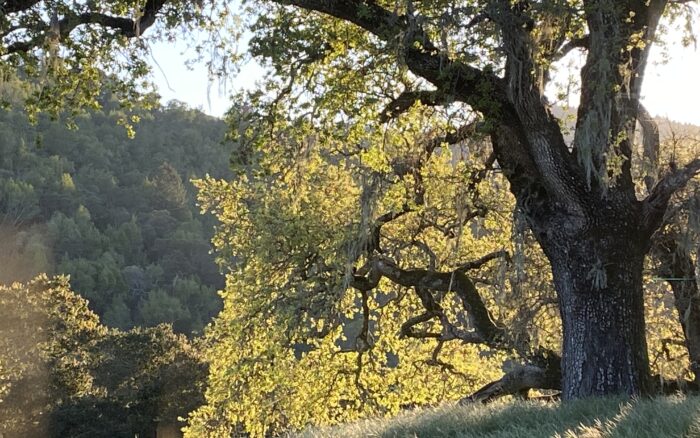Never read The Overstory, a beautifully written, transformative novel by Richard Powers, about trees and people and the earth, before going to bed. After reading another section last night, usually a great prelude to sleep, I couldn’t fall into that blessed state. When I must have accomplished some version of that, I slept fitfully, waking at 2 am for almost an hour. From there on out, it seemed I was awake more than asleep. Yet, when I rose through the ethers to check the clock (4 am), I realized dreams were the venue and that I had been sleeping. Nevertheless, I relieved myself of the suffering and finally got up.
My husband Donald says that trees are so big that we don’t see them. I believe he is correct, but maybe it’s not only because of their size. They are silent, stationary, subtly present. We take them for granted, and yet they provide so much: wood for our dwellings and fuel for heat; shade for cooling, beauty. They ensure hillsides stay in place and that watersheds function properly. But in The Overstory, we learn much more. Suddenly trees are spirited beings communicating with each other and providing food and lodging to the non-human of us, participants in an internet of life force. One of the beauties of this novel is its facts about trees.
I thought my ecologist sister Judy would love the story as I started reading it and after the first few pages, I had it sent to her. Amazon emailed me a picture of the box delivered to her front door. But last night as I lay trying to sleep, I could only swim in shame for sending it without warning her: that book is full of violence to trees, the clear-cutting of old-growth stands, the logging wars when tree-sitters lived in the tops of the few ancient redwood giants left for days and months. Injured by cut-throat, angry loggers ordered to move in anyway, regardless of injury, some retaliated by spiking trees, injuring or killing loggers, and burning equipment. I thought the novel would turn out better. (Yes, I finished it.) It has a sobering ending, one not quite hopeful, but on that continuum. See what you think.
This is not a bedtime story. But it is a true story, a version of the same process devastating our country and the earth: the lack of respect for life. Human life. Forest life. Fishes lives. Domestic “livestock” lives. All living creatures. The Overstory is replete in the science of Earth’s showing herself to be far more complex than we ever imagined. Earth will go on, with or without us. It’s time we recognize that we are only a small part of her, and make the necessary changes of attitude and behavior if we are to go on with her.
And it’s not just The Overstory that gave me sleep problems. I am working my way through The Dreamt Land: Chasing Water and Dust Across California, by Mark Arax, a history of water wars in California. I go back and forth between these books, which generated angst and anger at the process we all have benefited from: the unconscious exploitation of water and trees; Earth and each other, all commodified. Although painful to read, the books are critically important in understanding how we got here. Our faults as a population and as individuals are all there. Looking into the darkness of ourselves is a process that I, as a Jungian psychoanalyst, have been trained in, yet that makes it no less easy to bear. Yet, if we are to survive on Earth, we must bear the knowledge of our greed, and selfishness, our shortsightedness in viewing “the other”, whether human or non-human, as a “resource” or “less than”. We do not have to behave as a malignancy, eating and using up everything in sight. The growing consciousness afforded by witnessing what we are doing may just catapult us into a time we can live more gently with the Earth and with each other.
